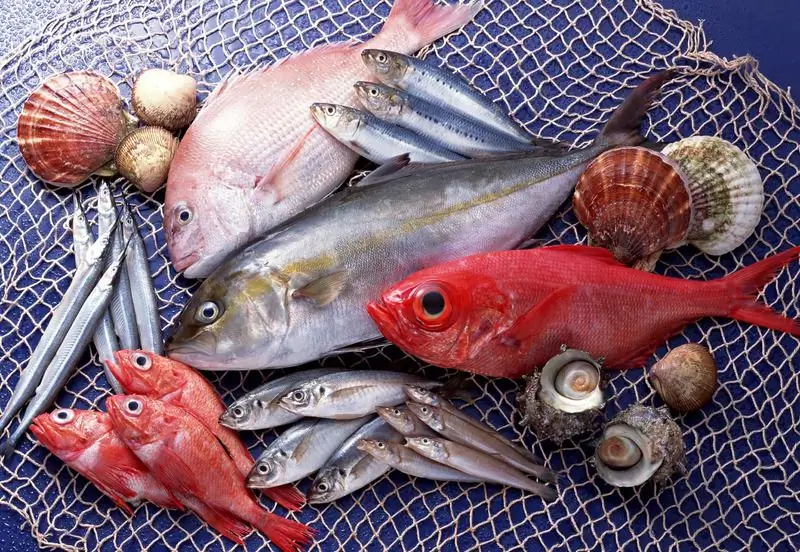
Table of contents:
- Author Bailey Albertson albertson@usefultipsdiy.com.
- Public 2024-01-07 21:36.
- Last modified 2025-01-23 12:41.
What kind of fish you can't eat: you didn't even know about some species

Fish contains many useful elements that are indispensable in the human diet. It contains vitamins, minerals, protein, fatty acids, including Omega-3. But the deterioration of the environment affects everything. Many fish species absorb substances from the environment that are toxic to the human body. The question arises: is it possible to eat seafood and fish at all? Which one is not allowed and which one is possible?
What kind of fish you can't eat and why
Sea water contains a large amount of salts, including heavy metal salts. The most dangerous are mercury and methylmercury - a neurotoxin that tends to accumulate in the cells of the body. From the water, this toxin enters the microflora and algae, and then into the fish. The longer a marine life lives, the more dangerous substances it contains. This is especially true of predators: they absorb everything that has been accumulated by their prey.
The high concentration of methylmercury in the body leads to Minamata disease. This disease was discovered in 1956 in Japan. It is characterized by impaired fine motor skills, impairment of speech, vision, hearing. In severe cases, it leads to paralysis and death. The disease manifested itself as a result of a high concentration of heavy metals in a nearby bay, the water in which was contaminated with effluents from a chemical plant.
Under normal conditions of life, the constant inclusion of fish in your menu will not have such disastrous consequences. But nevertheless, it is desirable to exclude from the diet species that accumulate a lot of mercury.

Swordfish tops the list of the most toxic species
How much mercury in fish is considered safe?
Mercury is not detected visually and taste. Its volume does not decrease during cooking. The exception is hot smoking. After this operation, the amount of mercury is reduced by about 20%.
Allowable standards for the content of mercury in fish:
- from 0.3 to 1 mg per 1 kg of weight, depending on the type - for Russia;
- from 0.5 to 1 mg - for EU countries.
How much mercury can a person consume without harm to health?
The World Health Organization cites the following figures. This is the maximum possible weekly intake of the substance into the human body.
- 4 μg per kg of human body weight for mercury;
- 1.6 mcg / kg for methylmercury.
Based on average weight values and taking into account the norms of mercury content, it is easy to calculate that a healthy person can eat fish every day. But pregnant and lactating women, young children need to avoid eating the most dangerous types of fish.
Video: what kind of fish is not recommended
In addition to mercury, fish can contain other hazardous substances. These include:
- Polychlorinated Biphenyls (PCBs). It is a carcinogen and PCBs are found in compound feed for fish farming.
- Antibiotics. Only a few countries (Norway) have abandoned the use of these substances in fish farming. Most farmed seafood contains high levels of antibiotics.
- Pesticides. The most dangerous of them (DDT) are banned in most countries. But they are still used in India and China. They enter the oceans not only with water, but also through the air, being volatile compounds.
Harmful and safe species: note to the hostess
The amount of accumulated mercury depends on the characteristics of fish nutrition, pollution of the region of habitation and the duration of its life. Long-lived large predators are considered the most dangerous. Eating them is not recommended at all.
Table: Most Toxic Fish Species by Mercury and PCBs
| Name |
Large amounts ofmercury |
PCBs |
| Swordfish | Yes | Not |
| Shark | Yes | Not |
| Marlin | Yes | Not |
| Croaker gray | Yes | Yes |
| Croaker white | Not | Yes |
| Sturgeon | Yes | Yes |
| Bluefish | Yes | Yes |
| Striped perch | Yes | Yes |
| Big-eyed and blue tuna | Yes | Not |
| Grayback | Not | Yes |
| Royal mackerel | Yes | Not |
| Shed | Not | Yes |
| European eel | Not | Yes |

Shed half-predator, depending on age, lives in the river and in the Atlantic Ocean, does not contain mercury, but has many other harmful substances
The next group of species is less dangerous, it contains less mercury:
- striped tuna;
- Pacific cod;
- white halibut;
- black sea bass;
- pompous;
- angler;
- rainbow trout;
- sea language;
- stingray;
- rabirubia;
- snappers;
- coal fish;
- sea bass;
- large luminary;
- lobe-finned species;
- yellowfin tuna and white tuna;
- oysters;
- sea eel;
- garrups;
- peto;
- spotted croaker;
- Spanish mackerel;
- serpentine;
- Atlantic bighead;
- toothfish Chilean Patagonian;
- farmed and wild salmon from Washington;
- reddish opa;
- winter flounder (flounder);
- paralychs (false halibuts).

A complete rejection of fish will significantly worsen the diet.
The safest are the following types of fish:
- Californian, European and Japanese anchovy;
- latex, other than those caught in the Indo-Pacific region;
- channel catfish;
- American Red Marsh Crayfish (not from China);
- lobster grown in California or Mexico City;
- Canadian lobster
- Atlantic mackerel;
- haddock;
- Peruvian sardine;
- red sea carp (tai);
- landlocked salmon, preferably from the northern regions;
- Atlantic mackerel;
- Norwegian herring;
- tilapia (sea chicken);
- shrimp;
- Atlantic scallops;
- squid.
Video: health school - how fish is useful
In no case should you refuse fish in your diet. But when choosing a product, it is advisable to take into account information on safe types of fish products.
Recommended:
Why And What To Do If The Google Chrome Browser Does Not Open The Pages - List The Main Reasons And Describe Solutions To The Problem

For some reason, Google Chrome does not open pages. Solution by clearing the cache, editing the hosts file, cleaning the registry, reinstalling the browser, etc
Nikolin Day In 2019: What Date Will Be, What Should And Should Not Be Done

Nikola Veshny's Day: what date is celebrated. Traditions and rituals, what to do and what not to do
Dormition Of The Blessed Virgin Mary In 2019: What Date Will Be, What Should And Should Not Be Done On This Day

What is the Assumption of the Blessed Virgin Mary. What restrictions and prohibitions apply on this day. Do's and Don'ts
Nut Spas 2019: What Date Will Be, What Should And Should Not Be Done

Nut Savior 2019: what date will be, signs, superstitions, what should and should not be done
What Foods Should Not Be Eaten After 45 Years

What foods should be avoided after 45 to maintain health and slow down aging
